Replying with the Enemy: Showrunners on Twitter II
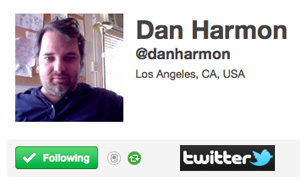 In my last piece on television showrunners active on Twitter I was focusing on their overall use of the social media tool, but this piece will focus on the direct interaction between showrunners and viewers – through “@ replies” – which Twitter makes possible. While most Twitter users (myself included) would tout this conversational potential as the service’s greatest value, creating a dialogue which can help form stronger relationships with your followers, it is also inherently risky: attempts at humor or sarcasm can be lost without context, leading to misunderstandings and conflicts which sour that relationship.
In my last piece on television showrunners active on Twitter I was focusing on their overall use of the social media tool, but this piece will focus on the direct interaction between showrunners and viewers – through “@ replies” – which Twitter makes possible. While most Twitter users (myself included) would tout this conversational potential as the service’s greatest value, creating a dialogue which can help form stronger relationships with your followers, it is also inherently risky: attempts at humor or sarcasm can be lost without context, leading to misunderstandings and conflicts which sour that relationship.
For showrunners, these risks and rewards are both magnified: replying could create a sense of a personal relationship with their followers, encouraging them to become even more connected to the text itself, but getting into long conversations with fans (especially antagonistic fans) could exacerbate the problem of viewers feeling turned off by showrunners’ Twitter behavior.
While the majority of showrunners will respond to an occasional comment, the one who seems most willing to engage in debate is Community’s Dan Harmon. Admittedly, some might characterize this debate as fairly sophomoric: bodily humor is a favorite of Harmon’s, and some of his replies are personal attacks played largely for comic effect.
Here is an example from early November:
There are two interesting things to note about this conversation. The first is that Harmon initiated it himself: since the initial tweet was not directed to him, it appears that Harmon found the tweet by searching the show’s hashtag, #Community (which is quite common). The other interesting insight is that only people who were following Harmon and the other user would read this tweet: the vast majority of Harmon’s followers, who are unlikely following this particular individual, would only find this tweet on Harmon’s home page, which users do not tend to visit on a regular basis. Thus, while this may be intended a sort of comic release of showrunner frustration, it is a very narrow form of comedy: Harmon could, if he desired, adjust the tweet so that all of his followers could see it, but this particular confrontation is only visible if you’re willing to dig for it.
However, while Harmon mounts several conversations of this nature in a given week, one of these dialogues is actually a long-running feud. @gwynnifer began tweeting to – or, more accurately, at – Harmon in 2009, before Community had even debuted and before the show gained a considerable online presence; however, most of Harmon’s followers became aware that these conversations were taking place just this year (mostly through his own efforts to publicize the feud, which also include making many of her tweets a “favorite”).
For the most part, Gwynnifer displays the traditional signs of what is referred to on the internet as a troll, someone whose posts are intentionally provocative to the point of obscuring their content: she swears, she makes unfounded claims, etc. Of course, one could argue that some of Harmon’s twitter replies meet the same criteria, but they have a clear comic sensibility (and are coming from a comedy showrunner). Gwynnifer, by comparison, is arguing that Harmon is a bigot, and that Community (like, according to Gwynnifer, his previous work) is inherently racist, topics of conversation which are not typically comic in nature.
While I would argue that racial representation on television is an important subject of conversation (for the reason Gwynnifer herself points out), Gwynnifer’s argument suffers from both a shallow reading of the series and a lack of context: not only does she seem to hold Community – with a regular cast featuring four minority characters – to a problematic standard relative to television as a whole (which is considerably less diverse), but her focus on personal attacks leaves little room for evidence or even any real argumentation.
There is a discussion to be had about the series’ depiction of race, and how its racial elements merge with its focus on satire, parody, and meta humor; this is certainly not that discussion. However, what happens when something we generally consider to be a “serious” subject becomes part of this type of discourse? Even if her arguments do not necessarily have merit, the conversation does have some value, so to see it trapped in a series of insults seems like an injustice.
However, while this particular conversation may result in a lesser discourse, Harmon’s Twitter account seems to have been influenced by it in what I would argue are positive ways. Recently, he linked to a post at Diversity Awareness as an extension of this debate, and its author argues that Community “needs a Mexican character” since people of Latin descent make up a large percentage of community college students. It’s a purposefully flawed piece, throwing out unfounded conspiracy theories – including that Harmon is “ignorant” – not dissimilar from Gwynnifer’s for comic value, but it led Harmon to offer the following comments:
While Gwynnifer’s argument may lack sufficient evidence, and the Diversity Awareness piece may fail to make any real contribution to this discussion, the conversation they sparked led to some insight into how Harmon views issues relating to class and race (and thus how those issues might fit into Community as a whole); regardless of whether you agree with him, that insight is a valuable discourse. Of course, this has since turned into a topic of comedy for Harmon, but this moment of “seriousness” speaks to the ways in which this sort of showrunner/viewer engagement can reveal something more than a showrunner’s love of humor related to fecal matter.
Not that there isn’t a place for that, of course.
Addendum
When I posted this piece yesterday, a number of critics alerted me that my timing was particularly good: in last night’s episode of Community, “Cooperative Calligraphy,” Gwynnifer became part of the series’ primary narrative.
While it may be a nod towards this Twitter conflict, it is not an extension: Gwynnifer is simply a name, in this case the name of Jeff’s date, which means that the majority of the audience is not likely to understand the context (which is why you might be here). It also resists the temptation to use the name for some sort of an attack: instead of naming the ringleader of the college “mean girls” after her in last week’s “Aerodynamics of Gender,” she is simply a girl that Jeff is going on a date with.
One could argue that the reputation of a girl who would date Jeff (and which Jeff would call a catch) is not precisely a positive reputation, but the relatively passive nature of the reference is an intriguing twist. And, speaking of intriguing twists, do check Jason Mittell’s comment below for another example of the above phenomenon from last evening.



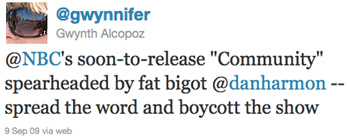
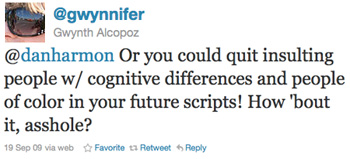
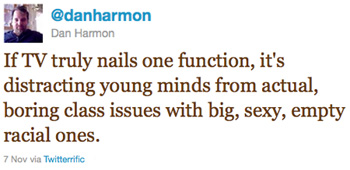
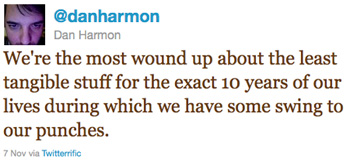


Do you not understand “Diversity Awareness” is a mocking diversity? Cause apparently that’s really funny, being for diversity? That’s why it’s a flawed piece?
You’re right – I perhaps undersold the site’s parodic function in the piece, likely because that is its own question about how these questions of diversity filter through that sort of comic form.
I will edit to better reflect this.
I thought it was pretty obvious that Diversity Awareness was satire. I wasn’t surprised when Harmon mentioned the “Mexican” blogpost, but I was surprised at how seriously he seemed to be taking it. His subsequent tweets about race seemed WAY too sensitive about race issues.
[…] Want to know why Jeff’s date was named Gwynnifer? […]
So either it was a coincidental happenstance, or this post triggered Dan’s random wrath last night.
The facts were these: prior to me watching last night’s Community, which had been praised by many advance viewers as the show’s best episode yet, I tweeted: “Time to see if tonight’s #Community will live up to the hype & cure cancer.” After the (very good) episode, I wrote: “Cancer not cured, but a fine episode of television. #Community”. 15 minutes later, Dan replied: “@jmittell you are cancer”.
Assuming it was meant as a joke – and that I’ve not done something that’s going to end up with me being mocked on a future episode – it highlights the limits of Twitter as a vehicle for humor. If you look at Dan’s page of posts, his comment to me was the last of a string of escalating insults aimed at fans who failed to sufficiently praise the show, with my cancer comment as the topper. But as Myles points out, that’s not how most people consume Twitter – you only see replies to people you also follow. So for most readers, the escalation is absent and you only see the singular comments aimed at you or those you follow.
It’s also interesting because, unlike some of the examples Myles gives, a lot of people did see his reply, as many of my followers in the TV studies & criticism worlds also follow Dan. This led to a number of playful exchanges with friends calling me cancer or calling Harmon a bully. What this does for his reputation as an accessible but short-tempered showrunner, I’m not sure. But it’s certainly not the model that most producers are following on Twitter…
And such is the mystery that is Twitter. What is it? A marketing tool? A forum for self-expression? The truth? A facade? While I’m not here to defend Mr. Harmon (he is more than capable of doing that himself), the question is raised as to what one expects if they follow someone on Twitter? Some one they do not personally know. What is one hoping to hear/read? Moreover what can one expect if they direct a Tweet at someone they do not really know? One might wish for civility, but, beyond that, do you actually get a glimpse into that persons personality? Or a game face? Do you get a playful reply? A response that can be misinterpreted? 140 characters is not alway nuanced. I don’t always “get” what Mr. Harmon Tweets, but that’s the price of admission on Twitter. And I always keep in mind that “unfollow” is only a click away.
I think the strange thing in this case (and others that Myles mentions) is that Dan’s comment to me wasn’t a reply to a tweet I made toward him, but rather plucked from the hashtag. We can assume that many people would be rather offended being called cancer after complimenting the show (even though I wasn’t), and I know some folks who saw the reply thought it was in poor taste at the least. The key element of Twitter that complicates things here is that it’s a conversation in semi-public, but the interface means that different users are going to see different versions of the conversation.
I wholeheartedly agree that the way Twitter works complicates even the most basic conversation. As if discussions on the Web were not puzzling enough already.
Just wondering – do you think Harmon was specifically alluding to the Kevin Garnett “cancer” comment flap in his tweet?
I don’t think so, but I thought of it too. “You’re Kevin Garnett” was one of my possible comebacks I was mulling, but decided to just let it lie…
Very small point: I’m just going to go out on a limb and say that Gwyniffer is totally not just a name. I’ve heard it used to refer to a hybrid of Brad Pitt’s ex-girlfriends/wives (Gwynthy+Jennifer), sort of a play on Bennifer or Brangelina. I realize this is a tiny point, but it makes it much, much easier to attribute the naming of the character with intent — I don’t think you need to hedge and say that “it could be just a name.” It could be just a name if the name was, oh, Jennifer, or Annie, or whatever. But Gwyniffer is a Twitter handle.
By just a name, I mean not that it was some form of happenstance, but rather that the reference does not go beyond the naming of the unseen character, resisting the broader attacks one might have presumed would be present based on the feud as a whole.
He did tell Gwynnifer that her disappointment can suck it. And while we didn’t get to hear exactly what she said to prompt that comment, it seemed pretty harsh under the circumstances of the plot.
Yeah – it certainly isn’t a wholly positive representation, but Jeff being mean to her is different than the show being mean to her. Also, Jeff’s overreaction spoke to the nature of the situation, as the claustrophobia of the “bottle episode” construct sets in.
Up until today, Dan’s Twitter feed had been a non-stop source of amusement for me. But now he’s tweeting half-baked thoughts like:
“If you said something bad in the last 12 hours: poop face. If you said good things: thanks. Humanity: uncomplicated since 500 billion BC.”
The message here is, “You’re a better human if you say nice things about my show than if you don’t.” He’s verging on Kurt Sutter-like levels of inability to accept lame Internet criticism. I knew I was in for a healthy dose of narcissism when I subscribed to his feed, but I never thought it would become nonsensical.
I want to unfollow but the behind-the-scenes pictures/videos he occasionally deigns to share are like crack. I love his show too much.
DAMN YOU HARMON.
Unfollow the guy, he doesn’t really care about it, I’m sure someone will RT the stuff you like (@community_tv is basically a filter)
And call me crazy but I think: “If you said something bad in the last 12 hours: poop face. If you said good things: thanks. Humanity: uncomplicated since 500 billion BC.” is better than a “I’m sorry you didn’t like the show, I will do everything I can in order to please the fans” type of message, I’ve seen a lot of showrunners reply like that to criticism (Note: I’m talking about the fans that like to boss around the showrunners and tell them what they have to do) and frankly, It’s refreshing to go to his twitter page and see him fucking with the fans. From what I’ve seen Kurt Sutter’s response to criticism is much more aggressive and off-puting.
Also… considering the man was drunk, It could’ve gone a lot worse
Plus http://twitter.com/danharmon/status/3875157990965248
While I’m linking to his twitter account, he tweeted this yesterday http://toast-is-burning.tumblr.com/post/1562949694/twitter-its-weird-in-there it’s a good read.
[…] "Replying with the Enemy — Showrunners on Twitter — Part 2"Showrunner Dan Harmon of "Community" tweets, even with his critics. Also check out Part 1. (Department of Communication Arts, University of Wisconsin — Madison) […]
[…] of bidrectionality in terms of the relationship between fan and show. When a Lindelof or a Dan Harmon or a Hart Hanson can control this illusion, using it to their advantage to engender an even more […]
[…] before the first season of Community, Harmon has been enmeshed in a public feud with Twitter user Gwynth Alcopoz, a.k.a. “Gwynnifer.” Sample exchanges from Gwynnifer to Harmon […]